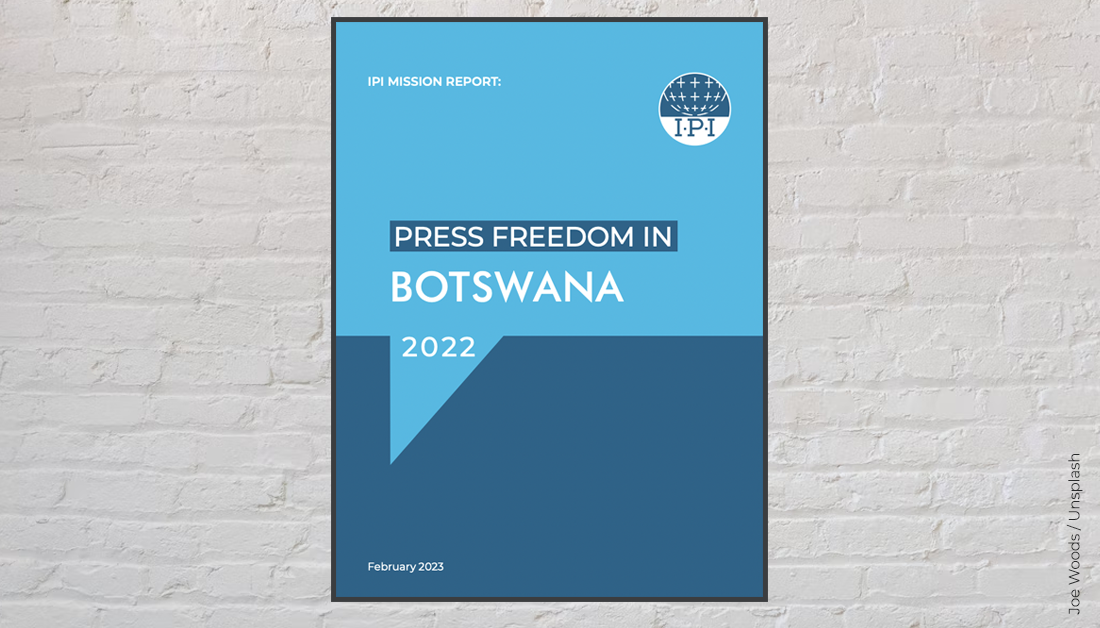While Botswana’s media environment is healthier than in several other countries in southern Africa, key reforms should be introduced to shore up protections for press freedom and to ensure that all media in the country are able to operate free of political and government interference, according to a report released today by the International Press Institute (IPI).
READ THE FULL REPORT HERE
The report summarizes key findings of an IPI-led mission to the country in August 2022, which IPI carried out in order to learn more about the challenges that journalists in Botswana face in being able to do their work freely, independently, and safely. During our visit, we met with a range of stakeholders that included journalists, civil society, government, political parties, and members of the diplomatic community.
Our delegation found that while there is space for critical media and independent journalism in Botswana, there are also key gaps in the legal and regulatory environment protecting press freedom. We welcome the passage of the 2022 Media Practitioners’ Association Act (MPAA), which was developed in consultation with the media community and is a positive step in clarifying the regulatory framework for the media. However, the government should continue to work together with stakeholders to modify key provisions of the MPAA to ensure full alignment with international press freedom standards, including revising registration restrictions on those who can practice journalism. We also encourage the government to initiate an open process of developing a long-awaited freedom of information law, in full consultation with domestic and international stakeholders and experts.
The ruling Botswana Democratic Party (BDP), which has been in power since Botswana won independence from Britain in 1966, has extensive influence over the democratic institutions is extensive and the media sector is no exception. State media largely operate as mouthpieces for the party and the BDP has outsized influence over the media market through its instrumentalization of publicly funded advertising.
We also remain concerned about the growth of the surveillance state in Botswana, despite the fact that the government rolled back controversial provisions of the 2022 Criminal Procedures and Evidence Act that allowed for warrantless surveillance. Many stakeholders with whom we met voiced credible worries over the expansive and unchecked powers of the government’s intelligence agency, the Directorate of Intelligence and Security Services (DISS), and the potential for government overreach and abuse.
Stakeholders also reported numerous forms of harassment of private media in the country. This includes reports that police and intelligence agencies have seized reporters’ equipment — including mobile phones, cameras, and laptops — without any legal basis or a warrant. Vexatious lawsuits against the media in the form of SLAPPs are on the rise and risk worsening the private media’s already precarious financial situation. Botswana criminal law includes several provisions, including sedition, that have been or could be used against the press.
These issues, combined with the government’s interference in the media market, are creating challenging conditions for independent, public-interest journalism in Botswana.
Botswana is proud of its democratic history and institutions, which are among the strongest on the continent. We also recognize that establishing the ideal legal, regulatory, and market conditions that enable independent media to thrive is especially challenging in today’s media environment. IPI, therefore, stands ready to work with all stakeholders in Botswana to help ensure that media are able to operate freely and independently.
Read the full report and our recommendations.
The mission was carried out as part of IPI’s Africa programme, which aims to defend press freedom and the safety of journalists in Africa. It was facilitated with support from KAS Media Africa, the Media Programme for Sub-Saharan Africa of the Konrad-Adenauer-Stiftung.
